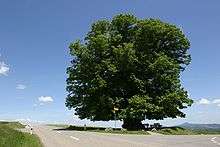Definify.com
Webster 1913 Edition
Arbor
Ar′bor
,Noun.
[Written also
arbour
.] [L., a tree, a beam.]
1.
(Bot.)
A tree, as distinguished from a shrub.
2.
[Cf. F.
arbre
.] (Mech.)
(a)
An axle or spindle of a wheel or opinion.
(b)
A mandrel in lathe turning.
Knight.
Arbor Day
, a day appointed for planting trees and shrubs.
[U.S.]
Webster 1828 Edition
Arbor
'ARBOR
,Noun.
1.
A frame of lattice work, covered with vines, branches of trees or other plants, for shade; a bower.2.
In botany, a tree, as distinguished from a shrub. The distinction which Linne makes, that a tree springs up with a bud on the stem, and a shrub not, is found not to hold universally; and the tree, in popular understanding, differs from the shrub only in size. Arbor forms the seventh family of vegetables in Linne's system. [See Tree.]3.
In mechanics, the principal part of a machine, sustaining the rest. Also the axis or spindle of a machine, as of a crane, or windmill.This in America is called the shaft.
Definition 2026
Arbor
arbor
arbor
English
Alternative forms
- arbour (chiefly British)
Noun
arbor (plural arbors or arbores)
- A shady sitting place, usually in a park or garden, and usually surrounded by climbing shrubs or vines and other vegetation.
- A grove of trees.
Related terms
Translations
a shady place for sitting
Etymology 2
Borrowing from French arbre (“tree, axis”), spelling influenced by Latin arbor (“tree”).
Noun
arbor (plural arbors or arbores)
- An axis or shaft supporting a rotating part on a lathe.
- A bar for supporting cutting tools.
- A spindle of a wheel.
Translations
axis or shaft on a lathe
Anagrams
Latin

arbor (a tree)
Alternative forms
Etymology
By rhotacism from Old Latin arbōs, arbōsis, cognate with arduus (“high”): the meaning is "high plant"; the Indo-European /dʰ/ was shifted to /b/. From the Proto-Indo-European *h₂erHdʰ- (“high, to grow”).
Pronunciation
- (Classical) IPA(key): /ˈar.bor/
Noun
arbor f (genitive arboris); third declension
Inflection
Third declension.
| Case | Singular | Plural |
|---|---|---|
| nominative | arbor | arborēs |
| genitive | arboris | arborum |
| dative | arborī | arboribus |
| accusative | arborem | arborēs |
| ablative | arbore | arboribus |
| vocative | arbor | arborēs |
Synonyms
Derived terms
Terms derived from arbor
Related terms
Descendants
Descendants
|
|
See also
References
- arbor in Charlton T. Lewis and Charles Short (1879) A Latin Dictionary, Oxford: Clarendon Press
- arbor in Charlton T. Lewis (1891) An Elementary Latin Dictionary, New York: Harper & Brothers
- ARBOR in Charles du Fresne du Cange’s Glossarium Mediæ et Infimæ Latinitatis (augmented edition, 1883–1887)
- Félix Gaffiot (1934), “arbor”, in Dictionnaire Illustré Latin-Français, Paris: Hachette.
- Meissner, Carl; Auden, Henry William (1894) Latin Phrase-Book, London: Macmillan and Co.
- the vegetable kingdom: arbores stirpesque, herbae stirpesque (De Fin. 5. 11. 33)
- the trees are coming into leaf: arbores frondescunt
- to plant trees: arbores serere (De Sen. 7. 24)
- to fell trees: arbores caedere
- the vegetable kingdom: arbores stirpesque, herbae stirpesque (De Fin. 5. 11. 33)
Old Spanish
Alternative forms
Etymology
From Latin arbor, arborem, from Old Latin arbōs, ultimately from Proto-Indo-European *h₂erHdʰ- (“high, to grow”).
Pronunciation
- IPA(key): [ˈar.βor]
Noun
arbor m (plural arbores)
- tree
- c. 1200, Almeric, Fazienda de Ultramar, f. 1v. b.
- ally delát ebró. es mót mãbre. e ouo y grát arbor. e fue enzina. ala rayz daq́l arbor estaua abraã.
- There, past Hebron, is the hill Mamre, where there was a great oak tree. Abraham was [sitting] on the root of that tree.
- ally delát ebró. es mót mãbre. e ouo y grát arbor. e fue enzina. ala rayz daq́l arbor estaua abraã.
- Idem, f. 42v. b.
- e crebantaredes todas cibdades en caſtelladas entodos los arbores fermoſos todas las fontanas del agua cerraredes. entodas las buenas seńas abatredes […]
- And you shall defeat all cities and fortified towns, and fell all the good trees, and seal all the springs of water and ruin all the good pieces of land.
- e crebantaredes todas cibdades en caſtelladas entodos los arbores fermoſos todas las fontanas del agua cerraredes. entodas las buenas seńas abatredes […]
- c. 1200, Almeric, Fazienda de Ultramar, f. 1v. b.